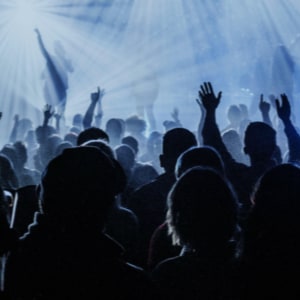There are few stoner metal frontmen like Mike Scheidt. Looking somewhat like the cross of a yoga instructor and nomad, Scheidt took the stage of Philadelphia’s Underground Arts on June 30, 2018, and paid little notice to the audience. Then, in true stoner meta fashion, the band launched into “Ablaze,” the first track off their new, critically acclaimed album Our Raw Heat.
Yes, “Ablaze” is rooted in impossibly low rumbling. Yes, “Ablaze” is an epic of a song that stretches out ten minutes and lives more as a hypnotic drone than a multi-part movement. Yes, Scheidt howled out in extended passages, building his soaring voice over the throbbing sound below.
But, whereas most doom metal types stay anchored to their position, scowling like they’re at a funeral, Scheidt seemed positively uplifted by the music. During “Ablaze’s” rising passages, he rocked forward out into the audience, flashing a Cheshire cat smile, his eyes pinned open with excitement. Doom metal, when considered to be a spiritual or moving experience, is often thought of as a solitary activity or meditation. Throughout the concert, Scheidt who can riff with the riffiest of them and can rumble with the rumble-est of them, countered that argument that doo/stoner metal is a collective activity.
Paradoxically, this was none more apparent than on “The Screen,” perhaps the new album’s simplest track and probably its best. Live, the song’s trance quality was increased with Aaron Riesberg’s three-note bass clomp made more prominent and perhaps even slowed down. Meanwhile, drummer Travis Foster pulled the doom metal-only trick of both playing with a laggard, but pensive beat that seemed to be in a constant state of bucking forward. Despite the track’s crushing and dour, Scheidt seemed to overcome with joy, and at times, seemed to want to climb into the audience and interact with others while the sonic tapestry did its cosmic connecting. Several times throughout the night, he seemed to lose control of his own appendages, stretching his hands out to the audience, jolting his arms upward as if to clasp hands with some astral force, and even, at other times, leaving the fretboard and flashing an ever changing array of hand gestures that seemed to spontaneously leap from his fingers. That is to say, the dude was connected to the music and through that, he was connected to the audience.
Perhaps the band’s most daring trick was how optimistic the whole gig felt. Instead of reveling in the gleeful nihilism of cosmic devastation ala Dopethrone, or embracing the somber inner-searching of Sleep, Yob made it a point to both have fun and be aware of one another. This was none more apparent than on the band’s extended rendition of the title track, which had its dynamics amplified live. Opening with a quiet, almost classical guitar wandering, the tune slowly (of course) built into a massive trudger that made it a point to focus on the more welcoming, gravelly aspect of Scheidt’s voice, as opposed to his alternate, ogre-growl style. As the tune climbed its massive staircase, several audience members raised their hands in the air and closed their eyes, not dissimilar to the audience poses found in Christian rock videos. Many doom metal bands focus on the cyclical nature of existence and how a continuum will always bend back around again- and Yob is no exception. Still, few bands seem to be able to prove this hypothesis in a live setting. Finding the connection between the massive blackness of thee mightee riff and audience upliftment is no easy task, but Yob found the connection in Philly.
